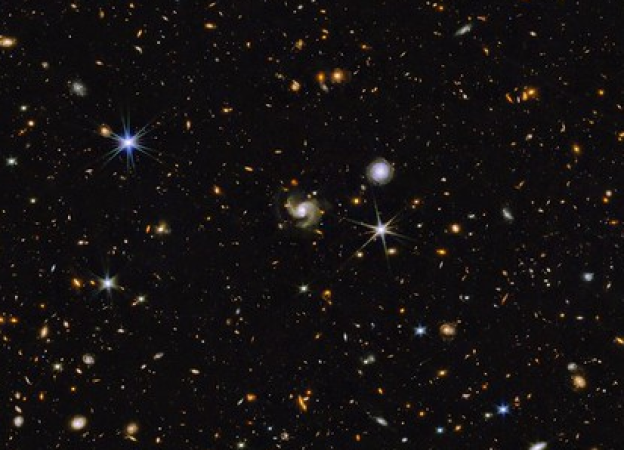Dark energy is weakening and the universe could (eventually) collapse, study says
Dark energy, a mysterious force that scientists believe is behind the accelerated expansion of the universe, is weakening — which could result in the universe over the course of billions of years collapsing on itself, according to new research.
An international group of more than 900 researchers studying the expansion of the universe presented their findings on Wednesday during the American Physical Society’s Global Physics Summit in Anaheim, Calif.
The scientists, who are collaborating on something called the Dark Energy Spectroscopic Instrument (DESI) are studying the history of the universe’s expansion out to 11 billion years in the past.
They analyzed three years of data from 15 million galaxies and quasars using a series of instruments, including a telescope.
Scientists have believed dark energy was a “cosmological constant,” but it is actually changing over time in unexpected ways.
Mustapha Ishak, co-chair of DESI and an astrophysics professor at the University of Texas at Dallas, tells NPR that current data shows that, at the beginning of the universe, dark energy was very strong. But it has weakened with time and will continue to do so, he says. For that reason, Ishak argues it’s time for scientists to update their understanding of the universe.
“Is it just [that] we are missing something big in the model of our universe and we just don’t know it? We are just measuring things and it means that we will have to stop, sit down and rethink our model of the universe,” Ishak says. “What it’s showing us is….it is actually a wild type of dark energy that we need to understand and we don’t understand it yet.”
Donghui Jeong, professor of astronomy and astrophysics at Penn State University who was not involved in the research, tells NPR while it’s too early to determine whether the results from DESI are definitive, it shows good progress is being made in understanding dark energy.
“If dark energy indeed is a time-varying component, this will open up a completely new way of thinking about the origin of dark energy,” Jeong says. “We have to think about how to scrutinize the properties of dark energy better from the current and future datasets.”
He’s a member of the Hobby-Eberly Telescope Dark Energy Experiment (HETDEX), is studying dark energy from an earlier time in the universe’s existence than DESI. It’s focused on sound waves from the universe’s first 400,000 years.
DESI’s findings also bolster another big theory among some astronomers – that the universe is going to end with a “big crunch.” While dark energy is weakening, according to Ishak, matter is not. Weak dark energy could strengthen matter, which eventually could be the force that causes the universe to collapse on itself, he says.
“We thought before that the universe will keep just expanding and expanding faster and faster and faster and faster.” Ishak says. “It [almost] becomes empty. Now, it is back to the table that the expansion of the universe also has the possibility that it will stop and then it will collapse.”
There is no evidence to show the universe has already stopped expanding and is collapsing on itself, Ishak says. And if that were to happen, it won’t occur for at least another 20 billion years, he says.
The new research builds on data released from DESI in April 2024 that found signs that dark energy was changing. DESI has been surveying the universe for four years and an analysis of five years’ worth of data is next for its research, Ishak says.
He hopes that data will confirm most of their findings and help them reach a new level of understanding the enigmatic force.
“We will use those numbers and we’ll try to find what is it, exactly, this dark energy. Is that a modification to gravity? Is this a new formula of energy in the universe?” he says.
Out with the mayo: How Ukrainians reclaim holiday food
For many people from former Soviet countries, New Year's is a big holiday feast time. A Ukrainian restaurant in Washington gives NPR a taste of what's on the menu.
His brother’s mental illness isolated his family. Now he’s helping other caregivers
When it comes to serious mental illness, family caregivers are crucial partners. But often, they must fend for themselves. A new solution offers them support.
50 wonderful things from 2025
Each year, critic Linda Holmes looks back on the year and compiles a list of the things that brought her joy.
Farmers are about to pay a lot more for health insurance
Tariffs, inflation, and other federal policies have battered U.S. farmers' bottom lines. Now many farmers say the expiration of federal health care subsidies will make their coverage unaffordable.
Why do we make New Year’s resolutions? A brief history of a long tradition
One of the earliest mentions of New Year's resolutions appeared in a Boston newspaper in 1813. But the practice itself can be traced back to the Babylonians.
In one year, Trump pivots fentanyl response from public health to drug war
Experts say Biden's focus on addiction health care saved tens of thousands of lives and slowed fentanyl smuggling. Trump scrapped Biden's approach in favor of military strikes.








